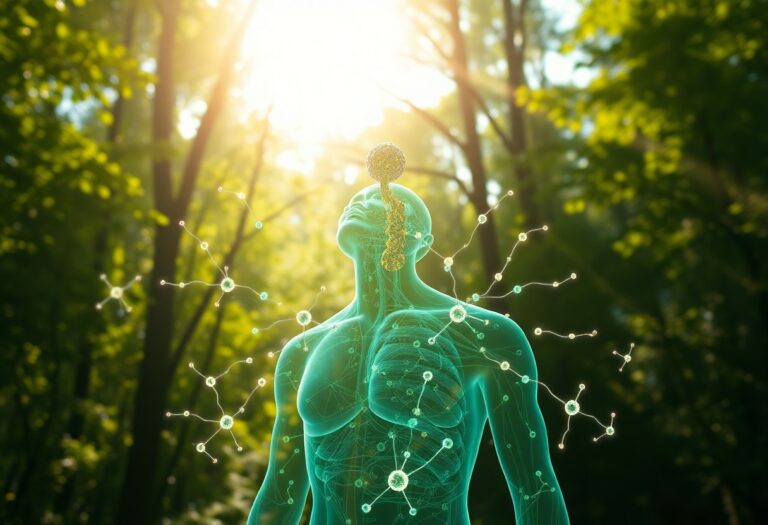What is Hypothyroidism?
Hypothyroidism is a condition in which your thyroid gland does not produce enough hormones. This gland is located just before the windpipe (trachea) in the neck.
Symptoms of an underactive thyroid include fatigue, weight gain, and depression. In many cases, underactive thyroid can be treated successfully by taking daily hormone tablets to replace the hormones your thyroid doesn’t produce.
An underactive thyroid cannot be prevented. Thyroid gland damage is usually caused by the immune system attacking the thyroid gland.
A thyroid function test, which measures hormone levels in a sample of blood, is the only way to determine whether you have a thyroid problem.
Who can be affected?
An underactive thyroid can affect both men and women, although it’s more common in women. An underactive thyroid can also develop in children, and some babies are born with it.
At about five days of age, all babies born in the UK are tested for congenital hypothyroidism using a blood spot test.
It produces hormones that help regulate the body’s metabolism (the process of turning food into energy). When thyroid hormones are not produced enough, many body functions slow down.
What is the main cause of hypothyroidism?
Hashimoto’s disease, an autoimmune disorder, is the most common cause of hypothyroidism. With this disease, your immune system attacks the thyroid. The thyroid becomes inflamed and can’t make enough thyroid hormones.
Symptoms of Hypothyroidism
As many symptoms of an underactive thyroid (hypothyroidism) are similar to those of other conditions, it can easily be misdiagnosed.
It may take several years before you realise you have a medical problem because symptoms usually appear slowly.
Symptoms include:
· Feeling tired
· Sensitivity to cold
· Putting on weight
· Feeling depressed
· Movements and thoughts are slow
· Weakness and muscle aches
· Cramps in the muscles
· Scaly and dry skin
· Nails and hair that are brittle
· Libido loss (sex drive)
· Hand and finger pain, numbness, and tingling (carpal tunnel syndrome)
· Periods that are irregular or heavy
An underactive thyroid can also result from previous thyroid treatment, such as surgery or radioactive iodine therapy.
How Functional Medicine can help Hypothyroidism
As Hypothyroidism requires some understanding of how the body’s stress organs and stress responses normally work to understand Functional Medicine.
You can support your liver with herbs, supplements, and foods such as onions, garlic, and cruciferous vegetables while avoiding alcohol and processed foods.
Maintaining a healthy liver and gut, as well as avoiding environmental oestrogens from cleaning products, plastics, and foods containing natural plant estrogens can help balance high oestrogen levels.
Thyroid testing can also reveal if your stress response or hormone levels are negatively affecting your thyroid. Individualised stress-management techniques can then be prescribed.
Another testing that we may use could include:
· Thyroid function test
· Digestive system testing
· Blood testing
· Urine testing
· Saliva Testing
· Heavy Metal testing
· Fatty Acid testing
· Anti-Oxidants
· Minerals and Vitamin Testing
Dr Stavy can prepare a personalised treatment plan for you based on a comprehensive analysis which can include:
· Advice on nutrition
· A plan and advice for exercising
· Medication
· A lifestyle change and recommendations
Rest & Recovery
To ensure your body has a chance to rest and recover:
Aim for 8 hours of sleep every night
Your bedroom should be dark, quiet, and cool
Try a wind-down routine
If all else fails, talk with your doctor
Even if your hypothyroidism is well controlled, high stress causes your body to release adrenaline and cortisol.
Diet
Hypothyroidism cannot be cured by food alone. You can, however, restore thyroid function and minimize your symptoms by combining the right nutrients and medications.
Your metabolism is controlled by the thyroid hormone. At rest, your body burns more calories if your metabolism is faster. Hypothyroidism causes people to produce less thyroid hormone. This means they have a slower metabolism and burn fewer calories at rest.
Having a slow metabolism comes with several health risks, including tiredness an increase in cholesterol levels, which in turn can make it harder to lose weight.
If you find it difficult to maintain your weight with hypothyroidism, try doing moderate or high-intensity cardio. This includes exercises like fast-paced walking, running, hiking, and rowing.
Research shows that moderate to high-intensity aerobic exercise may help boost your thyroid hormone levels. In turn, this may help to speed up your metabolism. People with hypothyroidism might also benefit from increasing protein intake. Research shows that higher protein diets help increase the rate of your metabolism.
Good foods for Hypothyroidism
Several nutrients are important for optimal thyroid health.
Iodine
The thyroid hormone is made from iodine, an essential mineral. Hypothyroidism is therefore possible in people with an iodine deficiency.
Iodine deficiency is very common and affects nearly one-third of the world’s population. In developed countries like the United States, where iodized salt and iodine-rich seafood are readily available, it is less prevalent. If you have an iodine deficiency, consider adding iodized table salt to your meals or eating more iodine-rich foods like seaweed, fish, dairy, and eggs.
Selenium
Selenium helps “activate” thyroid hormones so they can be used by the body. This essentially is less common in developed countries like the United States, where iodized salt and iodine-rich seafood areas. Selenium levels can be boosted by eating brazil nuts, tuna, sardines, eggs, and legumes.
However, avoid taking a selenium supplement unless advised by a healthcare professional. Supplements provide large doses, and selenium may be toxic in large amounts.
Zinc
Like selenium, zinc helps the body “activate” thyroid hormones. Studies also show that zinc may help the body regulate TSH, the hormone that tells the thyroid gland to release thyroid hormones. Zinc deficiencies are rare in developed countries, as zinc is abundant in the food supply. Nonetheless, if you have hypothyroidism, aim to eat more zinc-rich foods like oysters and other shellfish, beef, and chicken.
Bad foods for Hypothyroidism
There are several nutrients that may harm the health of those with hypothyroidism:
Goitrogens
Goitrogens are compounds that may interfere with the normal function of the thyroid gland.
They get their name from the term goitre, which is an enlarged thyroid gland that may occur with hypothyroidism. Many common foods contain goitrogens, including.
- Soy foods: tofu, edamame, etc.
- Certain vegetables: cabbage, broccoli, kale, cauliflower, spinach, etc.
- Fruits and starchy plants: sweet potatoes, cassava, peaches, strawberries, etc.
- Nuts and seeds: millet, pine nuts, peanuts, etc.
Hypothyroidism patients should avoid goitrogens. People with an iodine deficiency or who consume a large number of goitrogens seem to be most affected by this. Also, cooking foods with goitrogens may inactivate these compounds.
Pearl millet is an exception to the above list. Even if you do not have an iodine deficiency, pearl millet might interfere with thyroid function.
Exercise
Exercise can have beneficial effects for people with hypothyroidism—and help fight negative effects such as weight gain, depression, stiffness, joint aches, and muscle weakness.
If you have an underactive thyroid, an exercise routine can help to:
1. Improve energy levels.
Tiredness is one of the first symptoms people notice of hypothyroidism or low energy. There is some research which shows that low impact exercise can reduce fatigue but dont push yourself too hard. Starting slow and gradually increasing your activity levels, so you don’t overdo it and end up exhausted, will help.
2. Relieve symptoms of depression.
Depression and hypothyroidism can go hand-in-hand. Exercise is a natural remedy for low moods, and studies show that 45 minutes of moderate-intensity aerobic exercise three times a week has a significant effect on your mood.
Hypothyroidism slows your body’s metabolism, so weight gain is an unfortunate side effect.
3. Build muscle mass.
Muscle cramps and weakness can be caused by hypothyroidism. When you’ve got your condition under control, it’s time to build them back up—with strength training. Lifting weights or using your body weight as resistance can strengthen your body.
4. Ease joint pain.
Hypothyroidism can cause joint pain, so low-impact exercises such as swimming, tai chi, or yoga can help ease that painful feeling. When you build muscle with exercise, it lifts some of the stress on your joints, making movement less painful.
What type of exercise is best?
Choose an activity you enjoy which can include running, walking, swimming, hiking or even working out in a gym. An elliptical machine, exercise bike or even just walking is great choices for cardio workouts. Yoga and Pilates also can improve core muscle strength and help ease some back and hip pain.
Try to stick to your fitness plan for 30 to 60 minutes three times a week and combine that with healthy eating. Exercise won’t change your thyroid. However, with a regular fitness program, you’re likely to have more energy, be more agile, and feel happier.
Medication
An underactive thyroid (hypothyroidism) is usually treated by taking daily hormone replacement tablets called levothyroxine. Levothyroxine replaces the thyroxine hormone, which your thyroid does not make enough of. You may start on a low dose of levothyroxine, which may be increased gradually, depending on how your body responds. Some people start to feel better soon after beginning treatment, while others do not notice an improvement in their symptoms for several months.
You’ll initially have regular blood tests until the correct dose of levothyroxine is reached, which can take a little while to get right. Once you’re taking the correct dose, you’ll usually have a blood test once a year to monitor your hormone levels.
Supplements
Research indicates that dietary changes, including supplements, may help treat some thyroid illnesses in addition to standard treatments for thyroid issues. However, some supplements might be more detrimental to thyroid health than beneficial.
There will probably be a section on thyroid health in the supplement aisle of a health food store. Despite the fact that some of these items are safe, certain thyroid supplements may have unfavourable side effects or even damage your thyroid. Prior to discussing the reasons why thyroid-specific supplements might not be the ideal option for everyone, it is critical to clarify what nutrients the thyroid requires for proper operation. The following are some of the essential vitamins and minerals for thyroid health:
- Selenium.
- Iodine
- Zinc
- Iron
- Other nutrients, including B vitamins and vitamins A and E, are also needed for optimal thyroid function. Being deficient in one or more nutrients can negatively affect thyroid health and increase your risk of thyroid disease.
To preserve general health, including thyroid function, some populations may need to supplement their diets with vitamins, minerals, and other nutrients.
Should you take thyroid-specific supplements?
There is little question that a healthy diet with adequate nutritional levels is crucial for preserving thyroid function and that nutrient deficits can result in thyroid problems. However, there’s often no need to take thyroid-specific supplements if a person has a healthy thyroid and consumes a diet rich in nutrients. In reality, several supplements sold to people who want to support thyroid health may be harmful to take.
For instance, many thyroid pills have significant iodine content and could even have thyroid hormones. Those with healthy thyroid function who take these supplements run the risk of developing serious side effects as well as thyroid problems.
For more information or if you would like to discuss treatment and management for hypothyroidism with Dr Stavy then please contact us via email: info@drstavy.com



